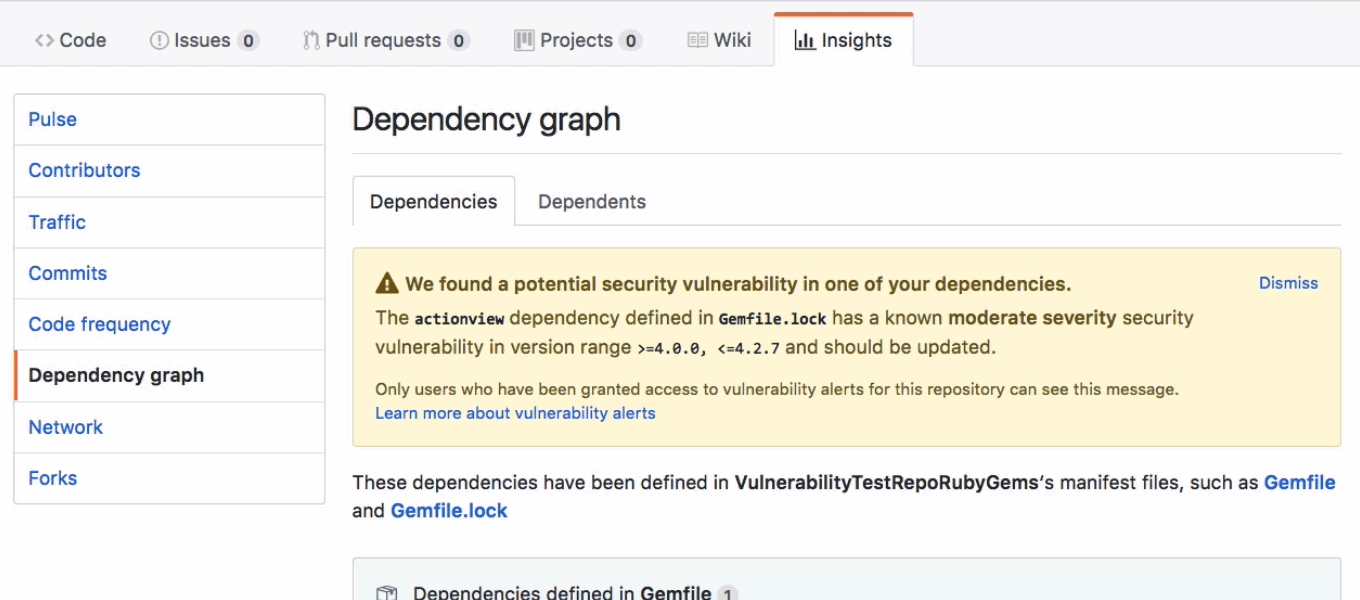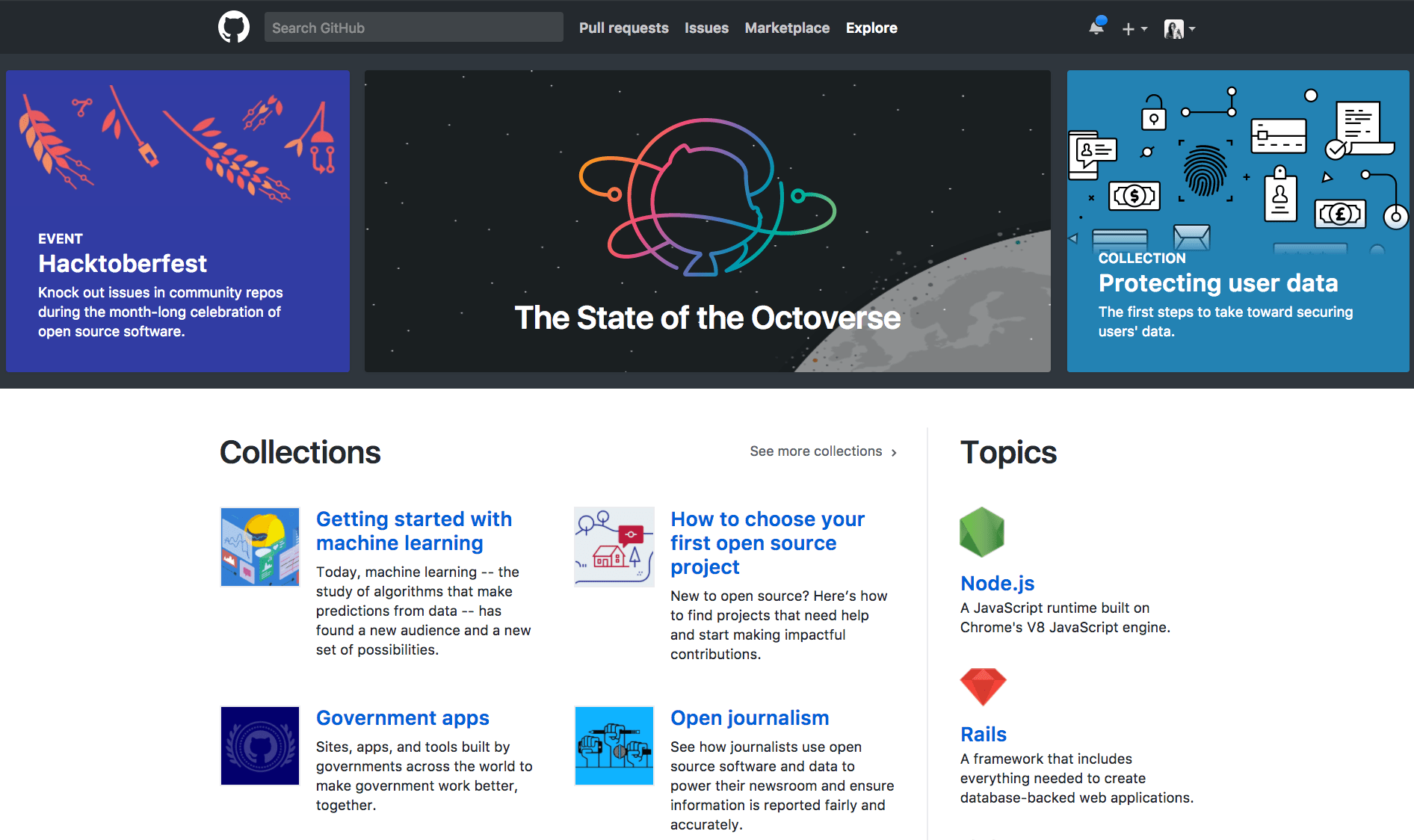A more connected universe
Almost a decade ago, GitHub was created as a place for developers to work together on code. Now, millions of people around the world use our platform to build businesses,…

Almost a decade ago, GitHub was created as a place for developers to work together on code. Now, millions of people around the world use our platform to build businesses, learn from each other, and create tools we’ll use for decades to come. Together, you’ve shown that some of the most inventive, impactful things happen when curious and creative people have a space to work together.
Today, at GitHub Universe, we shared plans to build on our ten years of experience and 1.5 billion commits. We’ve taken the first step toward using the world’s largest collection of open source data to improve the way we collaborate with these new experiences.
Protect code with your dependency graph and security alerts
There are millions of open source projects on GitHub. If you build software, your code likely depends on at least one of those projects. Now, our data can help you manage increasingly complex dependencies and keep your code safer as you work on connected projects—even for private repositories.
Dependency graph
The new dependency graph gives you insight into the projects your code depends on and projects that depend on your code. Now you can see all of the packages and applications you’re connected to, without leaving your repository. Your graph currently supports Ruby and JavaScript, and Python support is on the way!
Learn more about your dependency graph
Security alerts (coming soon)
Soon, your dependency graph will be able to track when dependencies are associated with public security vulnerabilities. We’ll notify people who have access when we detect a vulnerability, and in some cases, suggest a known security fix from the GitHub community.
Security alerts are the first in what we hope will be a robust collection of tools to keep your code safe, and we need people who build on our APIs to help us make them even better—and to keep security data current for the community. We can’t wait to see what you can do!

Discover new projects with news feed and Explore
With more than 25 million active repositories on GitHub, there are new ways to get involved in projects and communities every day. We have two improved experiences that will help you find the ones you’re interested in.
News feed
Your updated news feed connects you with opportunities to explore and expand your corner of GitHub like never before.
Behind the new “Discover repositories” feed on your dashboard, you’ll see recommendations for open source projects to explore. These recommendations are tailored to you based on people you follow, repositories you star, and what’s popular on GitHub.
You’re in control of the recommendations you see: Want to contribute to more Python projects? Star projects like Django or pandas, follow their maintainers, and you’ll find similar projects in your feed. You can also dismiss any updates you’re not interested in, and you’ll see less like those in the future. The “Browse activity” feed in your dashboard will continue to bring you the latest updates directly from repositories you watch and people you follow.
Explore
We’ve completely redesigned the Explore experience to connect you with curated collections, topics, and resources from GitHub contributors around the world.
Collections are hand-picked resources from the GitHub universe and beyond. Browse collections to learn about ideas that interest you, like machine learning or game development, and find repositories and organizations that help you dig deeper.
Topic pages help you find projects related to technologies, languages, frameworks, or platforms—thanks to the GitHub community’s topic tags. Use topic pages to find all Android or CSS projects for example, and suggest edits to topic pages in our public repository.
Other ways to connect
We’re also introducing Premium Support for GitHub Enterprise, and we’ll be introducing a new Community Forum, Marketplace trial program, and team discussion tool soon.
This is just the beginning
These experiences are a first step in using insights to complement your workflow, but there’s so much more to come. With a little help from GitHub data, we hope to help you find work you’re interested in, write better code, fix bugs faster, and make your GitHub experience totally unique to you.
We can’t wait to get building, and more importantly, see what you build when you have all of the right tools and people behind you.
Today’s launches wouldn’t be possible without all of your work on open source projects over the last decade. The future of GitHub is in the hundreds of millions of commits you’ve already made. Thanks for everything you’ve contributed so far.
Want to see all of the work you’ve been a part of? See our community’s year in data:
Tags:
Written by
Related posts

GitHub availability report: January 2026
In January, we experienced two incidents that resulted in degraded performance across GitHub services.

Pick your agent: Use Claude and Codex on Agent HQ
Claude by Anthropic and OpenAI Codex are now available in public preview on GitHub and VS Code with a Copilot Pro+ or Copilot Enterprise subscription. Here’s what you need to know and how to get started today.

What the fastest-growing tools reveal about how software is being built
What languages are growing fastest, and why? What about the projects that people are interested in the most? Where are new developers cutting their teeth? Let’s take a look at Octoverse data to find out.

